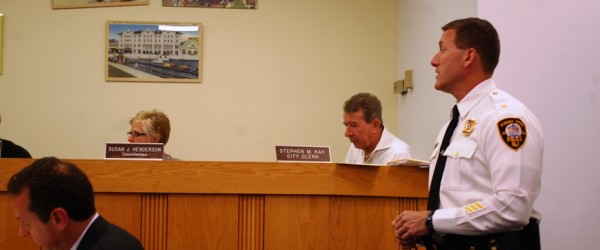Chief’s talk focuses on internal affairs
Number of confirmed incidents down this year
Police Chief Mark Kinmon last night focused on internal affairs at a chief’s advisory meeting in city hall. The meeting was the second of its kind. The first took place in April.
The public was invited but turnout was light, despite many residents having voiced concerns at council meetings about the department’s internal affairs.
“The people that had the most concerns about [the internal affairs] process are not with us tonight, but we can always get information to them,” Kinmon [pictured above, right, at a council meeting] said. He added he had personally invited some citizens who had specifically inquired about internal affairs.
POLICE CONDUCT
The Asbury Park Police Department [APPD] deals with police conduct through its internal affairs unit. Three officers are assigned to that unit, the chief said, which is “the most we’ve ever had assigned to handle all the incoming complaints about police conduct.”
The internal affairs process begins when a citizen — or another officer — makes a complaint, “whether they’re anonymous, on the phone or a third party,” Kinmon said. “Complaints have to be taken and they’re referred to our internal affairs for investigation.”
During investigation into the complaint, police break the incidents into two categories: administrative investigations and criminal investigations.
If the incident is deemed criminal, it’s then placed into one of eight categories: excessive force, criminal violation, improper search, improper entry, improper arrest, rule violations, demeanor complaints or deferential treatment.
After the investigation is complete, it receives one of four outcomes: sustained, not sustained, exonerated or unfounded.
A sustained outcome means the department has enough information to prove the officer did something wrong. A not-sustained outcome means the case cannot be proven.
An exonerated outcome means the complaint was founded, but the officer’s perceived transgression was justified. And an unfounded outcome means the department can prove the perceived violation did not occur.
All officers are given a procedure manual outlining the APPD’s internal affairs policies, Kinmon said. And Kinmon meets with the internal affairs unit to go over cases every other week, he said.
INTERNAL AFFAIRS STATISTICS
Most of the APPD’s internal affairs issues stem from demeanor complaints, Kinmon said. If the department receives many complaints about the same officer, they often seek outside help in the form of anger management or psychiatric treatment, he said, as well as in-department disciplinary measures.
Discipline begins with counseling and coaching sessions, escalating into written warnings then suspensions and forfeit of vacation leave and ultimately, if warranted, termination, the chief said.
The chief provided attendees with a list of statistics for all eight categories of internal affairs incidents with data going back to 2003. Incidents, both reported and sustained, are fewer in number this year than they were in previous years.
The total reported incidents to date this year is 39. Last year, 72 incidents were reported. In 2010, 82 were reported. The number in 2009 was 58.
The highest reported in 10 years was 96 in 2005, and the lowest was 35 incidents reported in 2003. There have been increases and decreases from year to year, but not an overall upward or downward trend.
The total number of sustained, or confirmed, incidents this year to date is six. Last year, 25 incidents were sustained — the highest in 10 years. The lowest was five incidents sustained in 2003. As with the total number of incidents reported, numbers have gone up and down over time without a discernible trend over the past 10 years.
The APPD handles 35,000 calls for service every year and also interacts with the public through police-induced citizen contact, the chief said, meaning there are 60,000 to 70,000 instances of interactions between the police and the public per year.
“We have 80 or so complaints every year, which really is not bad,” he said.
Also, about 30 of every 80 complaints are police-initiated, not called in by citizens, the chief said.
CIVILIAN REVIEW
Some citizens have called for a civilian review board to monitor police department activities. Kinmon has repeatedly said the city will not enact a civilian review board.
The state attorney general’s guidelines on internal affairs say the information about accused officers and complainants “shall remain confidential,” the chief said, “which is one of the main reasons I oppose a civilian review board … We have pretty good oversight from the [Monmouth County] Prosecutor’s Office and when they think we’re not doing something we should be doing, they step in and let us know.”
The department brings in outside agencies like the prosecutor’s office for classes and training as well, Kinmon said. The department has also made an effort in recent years to maintain a presence at local schools to build relationships with the youth and improve relations between police and the public.
The chief plans to hold another meeting in late September, he said.














